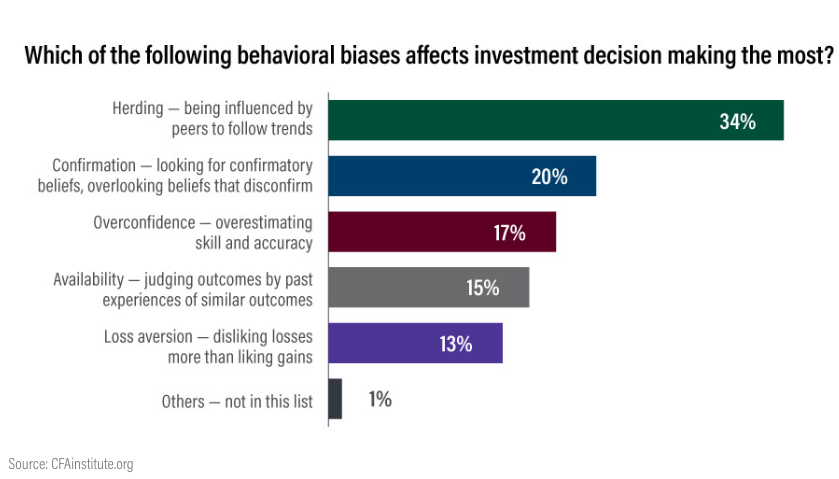Investing in the Decade’s ‘Hot Stocks’ May Leave You Out in the Cold
Trends in portfolio management are nothing new. As fiduciaries, it’s Schmitt Wealth Advisers’ role to look beyond the trends and advise with experience and wisdom. We recently mentioned two common pitfalls when investing in stocks. Today, we’re exploring the risks of following a herd mentality.
Over the decades, financial news anchors and stock trend watchers have created memorable names or acronyms to describe the prevailing trend du jour.
In the 1960’s and early 1970’s, it was the Nifty Fifty stocks that more-or-less dominated the market. A 2014 USA Today article “Remember The Nifty Fifty” highlighted some stock names and characteristics of the craze. Some companies are still operating today, like:
- Coca Cola
- General Electric
- JNJ
- Merck
- McDonald’s
However, a few are struggling or no longer exist at all. These include:
- Eastman Kodak Company
- Polaroid
- Simplicity Pattern
- SS Kresge
One key characteristic the article noted was that the average Nifty Fifty stock P/E ratio (price-to-earnings) was generally more than twice that of the overall stock market at that time.
Not-so-Nifty Portfolio Management Trends in the 1990’s & 2000’s
In the late 1990’s and early 2000’s, it was Y2K and the Dot Com/Tech boom era. A CFI article mentions tech boom survivors like Microsoft, Amazon, and Cisco, along with some companies that no longer exist, such as:
- Pets.com
- Webvan
- eToys
The article noted that companies caught up in the tech boom saw their stock prices rise “much faster than their peers,” leading to their over-valuation verses the overall market.
Readers of a certain age will remember with clarity how that Dot-com bubble popped. Hopefully, their portfolio was diversified at the time.
Trendy Portfolio Management Grows Teeth (or, FAANGs, at Least)
In the mid 2010’s, it was the FAANG stock era. FAANG was an acronym consisting of the first letter of each company in the favored group:
- Apple
- Amazon
- Netflix
Today, Stock Trends in Portfolio Management is Increasingly Focused (What Happened to Diversification?)
This year, a new group of companies, known as the Magnificent Seven, are the darlings on Wall Street. Seven companies have seen outsized stock price appreciation versus the general stock market so far this year. These stocks are:
- Apple
- Microsoft
- Nvidia
- Amazon
- Alphabet (Parent company of Google)
- Meta Platforms (Parent company of Facebook)
- Tesla
As with previous eras mentioned above, the Magnificent Seven stocks of the 2023 era generally have higher valuations than the overall market today. Today’s market favorites are even more concentrated (only seven) compared to the “Nifty 50” of earlier eras.

Disciplined Portfolio Management Rides Alone… on Rational Discipline
Whether it’s today or during the next stock “era,” consider some of the risks and the potential pitfalls that you may experience should your portfolio management follow the herd. Before making any emotion-driven investment decisions, take a look at the prescient article published by the AMG Group called, “The Urge To Herd.” Here’s the key takeaway, although I recommend the entire article:
“A recent advisor survey from CFA Institute identified herding as the single most destructive behavioral bias affecting individual investors (see chart). As its name implies, the herding instinct describes the powerful drive we all have to blindly follow what others around us are doing. A decision to follow the crowd taps into deeply rooted relational desires in the human brain to appear wise to others and to avoid looking foolish. Herding is one of several behavioral biases that are credited for the low returns investors have earned versus the overall market throughout the last several decades.”
As you can see from the referenced chart, 34% of advisors ranked herding as the bias that most affects investment decisions:

Take the emotion out of portfolio management and invest with a rational discipline instead. For more investing insights from Schmitt Wealth Advisers, visit Our Outlook blog. Want to start a conversation about your financial future? Contact us.
This material is provided by Schmitt Wealth Advisers, LLC for informational purposes only. It is not intended to serve as a substitute for personalized investment advice or as a recommendation or solicitation of any particular security, strategy, or investment product. Opinions expressed by Schmitt Wealth Advisers are based on economic or market conditions at the time this material was written. Economies and markets fluctuate. Actual economic or market events may turn out differently than anticipated. Facts presented have been obtained from sources believed to be reliable. Schmitt Wealth Advisers, however, cannot guarantee the accuracy or completeness of such information. Past performance may not be indicative of future results.

